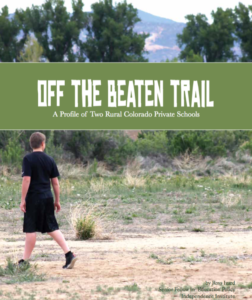Rural Colorado Needs School Choice Too

Rural towns face unique difficulties and therefore require unique solutions in their communities, and education is no exception.
Read More...
Rural towns face unique difficulties and therefore require unique solutions in their communities, and education is no exception.
Read More...The House of Representatives’ newly proposed tax reform would greatly impair the Cristo Rey Network’s ability to provide educational opportunities to low-income students. The Washington Examiner’s Todd Shepherd–the Independence Institute’s former investigative reporter–describes the negative implications of the proposed tax reform in his piece House tax reform could cripple innovative education model aimed at low-income families. My good friend, and senior fellow at the Independence Institute, Ross Izard, wrote a private school profile called Building Hope: A Profile of Arrupe Jesuit High School that exemplifies the local impact of the Cristo Rey Network here in Colorado. Cristo Ray’s consortium of high schools emphasizes the combination of “four years of rigorous college preparatory academics with four years of professional work experience.” The network is Catholic, but open to all students. Its primary concern is helping low-income students reach success, despite religious affiliation. The network is incredibly successful–it has graduated over 13,000 students, 90 percent of which enroll in college. That’s an enrollment rate 29 percent above the national average for low-income students and 4 percent above the national average for high-income students. The average Cristo Rey household earns around $37,000 annually, but the network’s 32 schools are exclusively private, college-prep institutions. To […]
Read More...“The king is dead, long live the king.” Have you heard that one before? It’s a phrase a variety of countries have used to simultaneously announce the death of a monarch and the ascension of a new one. The phrase has survived into the modern era in part because it provides an excuse to use the word epanalepsis and in part because it turns out to be a pretty poignant description of the lack of change when regimes shift. I was reminded of this old phrase while reading a recent blog post by American Enterprise Institute education guru Rick Hess, who has been working for a while now to prevent education reformers from morphing into a new education establishment. This particular post is in response to a number of folks who took issue with a previous Hess post criticizing the amount of bureaucratic paperwork involved in crafting state education plans under the Every Student Succeeds Act. You know, like the 150-page one Colorado submitted in May. In that post, Hess wrote: The vapidity of the exercise would be unremarkable if everyone clearly understood that these filings are the kind of pointless, paper exercise demanded by 21st century bureaucracy, and that the […]
Read More...Just last week, we were talking about the record number of local school-related tax increases on the ballot and how those increases fit in the context of school finance overall. I even had a reader named Larry write in to correct me on a misspelling of Michael Phelps’ name. I incorrectly thought his name was Michael Phelp (with no “s”). I suppose that’s what I get for not watching swimming. I am dreadfully ashamed of the error, and hope Mr. Phelps (and Larry) can find it in his heart to forgive me. Fortunately, I won’t need to make any swimming references today. Instead, I’d like to continue the conversation on Colorado school finance by briefly highlighting a new issue paper published by my Independence Institute policy friend Ross Izard.
Read More...I broke out my (heavily used) soap box a couple weeks ago to talk about the importance of having a seat at the education policy grown-ups table. We talked about Hillary Clinton’s promise to guarantee the National Education Association some level of policy influence, as well as some of the questionable stuff that has come out of working groups here in Colorado that are woefully devoid of any semblance of balanced perspectives. I finished the post by calling for Colorado’s new working committee on the Every Student Succeeds Act to be more inclusive of reform-minded voices, and worried aloud that the deck had already been stacked in favor of the omnipresent education establishment. It looks like I spoke too soon.
Read More...